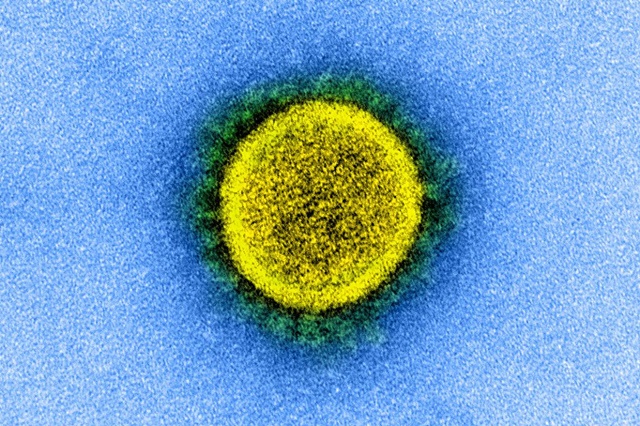
Transmission electron micrograph of a SARS-CoV-2 virus particle, isolated from a patient. (NIAID, NIH)
19 May 2021. A biotechnology company developing cancer therapies is receiving an NIH grant to extend its technology for antiviral peptides against the SARS-CoV-2 virus. National Institute of Allergy and Infectious Diseases, part of National Institutes of Health, awarded Sapience Therapeutics Inc. in Harrison, New York nearly $300,000 for the 15-month project.
Sapience Therapeutics is creating cancer therapies, particularly for types of cancer considered difficult to treat. The company’s technology aims to block interactions between proteins causing cancerous cells to develop or limit the immune response against tumors. Because these protein interactions take place inside cells, they’re often difficult to reach with chemotherapy or complex biologics, such as synthetic antibodies. Sapience designs its cancer therapies as peptides, short chains of amino acids that penetrate cells and disrupt these protein interactions.
The company’s lead product, code-named ST101, is a peptide designed to block C/EBP-beta, a transcription factor protein activated by some cancers that promotes further cancer cell proliferation. Since healthy cells do not need this transcription factor, targeting C/EBP-beta works against only cancer cells. Sapience is testing ST101 in an early- and mid-stage clinical trial among patients with advanced solid tumor cancers, either metastatic or not able to removed by surgery, that began dosing patients in August 2020.
The NIAID award funds early development of an antiviral peptide that blocks the S protein on the SARS-CoV-2 spike surface, which Sapience says involves a series of protein interactions. One part of this protein, called S1, is in the protein’s receptor binding domain and binds to ACE2 receptors in the host cell. This binding process, says the company, triggers another part of the protein called S2 that pushes the viral envelope close to the host cell to encourage fusion with the virus.
Antiviral peptide for HIV already on the market
Sapience proposes developing a peptide that disrupts these protein interactions. The company plans to test various peptide candidates in lab cultures, then in animals. The Sapience team is looking mainly for binding action and viral neutralization, but also for the ability to prevent viral mutations from evading the peptide, and to limit viral shedding.
Gene Merutka, Sapience’s vice-president for chemistry and manufacturing, notes in a company statement that at least one other antiviral peptide for blocking protein interactions is already on the market, Fuzeon by Genentech, to treat HIV infections. “With an FDA-approved peptide that inhibits HIV-1 viral fusion already in use,” says Merutka, “peptides as a therapeutic class have been demonstrated to be well suited for this purpose. If successful, peptides may provide a more cost-effective and novel treatment option for newly diagnosed cases of coronaviruses.”
The award is a Small Business Innovation Research or SBIR grant made under NIH’s small business programs that set aside a part of the agency’s research funding for U.S.-based and owned companies. SBIR grants fund work by research companies in the U.S., and in most cases are made in two parts: a first phase to determine technical and commercial feasibility, and a second phase to develop and test a working prototype or prepare for clinical trials. This grant is a phase 1 award that runs through August 2022.
More from Science & Enterprise:
- Antibody Clears Covid-19 Variants, Enters Trial
- Trials Adding Covid-19 Hospital, Out-Patient Therapies
- Lilly Asks FDA to Revoke Covid-19 Therapy Clearance
- Antibody Cocktail Prevents Covid-19 Disease Symptoms
- Arthritis Drug Unsuccessful for Covid-19 Hospital Patients
* * *

 RSS - Posts
RSS - Posts
You must be logged in to post a comment.